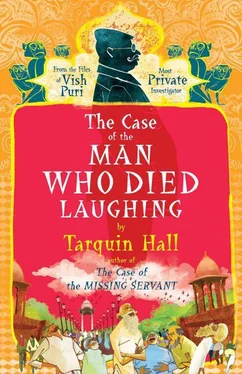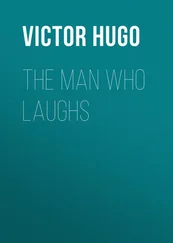“Next time, then,” said Pandey with a grin. “Keep smiling. Remember, laughter makes the world go round! Ho ho! Ha ha ha!”
* * *
Puri hurried across the street, fleeing from the sweltering heat and humidity, and called to Handbrake to get the Ambassador’s engine started. The driver, who had been trying to keep cool by the side of the road, jumped to attention and did as instructed. The car trembled into life, and within a minute or so the dashboard vents began to produce wafts of tepid but nonetheless welcome relief.
Puri sat back in his seat. His underwear was damp and was clinging to his skin. It was not the only thing making him feel uncomfortable. Something wasn’t right – about Pandey, that is.
“Number one,” Puri told Tubelight over the phone after they discussed plans to meet at Shadipur Depot at eight o’clock. “This fellow is positively merry. Like he is celebrating, in fact. Yet his friend has been viciously murdered. Second, why he said he attended Dr. Jha’s funeral when he did not?”
Puri saw no contradiction in a man of science also believing wholeheartedly in the miraculous. That was a common Indian characteristic. Still, there was something about his version of events that did not ring true – the description of the disintegrating sword being the most obvious disparity.
“Want him tailed, Boss?”
“Night and day. This fellow is up to something. Undoubtedly.”
Puri also asked Tubelight to check into Shivraj Sharma’s background. “That one has skeletons in his cupboard. No doubt there are one or two in his basement, also.”
Two hours later, after eating his fill of paapri chaat with lashings of tamarind chutney at a roadside stand, Puri descended underground on an escalator at Central Secretariat.
As the honking of the traffic faded and the air turned pleasantly temperate, he found himself in a cavernous, fluorescent-lit netherworld of gleaming floors and untarnished walls.
He bought a token for a few rupees at one of the efficiently run ticket counters, passed through the security check and automatic barriers, stood in an orderly line on the platform and boarded a shiny silver train.
Being whisked through tunnels more than twenty meters below the surface of the capital at fifty miles per hour was a great source of pride for the detective – as it was for most Delhiites, some of whom, he suspected, ventured underground just for the thrill of it. The construction of the Metro was a phenomenal success story. The first section had been completed to international standards within budget and ahead of schedule. The secret of the system’s success lay in the fact that it was not run by politicians and bureaucrats – as was the case with the Calcutta underground, which was a disgrace – but an autonomous, for-profit entity. It bore testimony to the capabilities of India’s private sector – “world-class beaters,” in Puri’s words.
The Metro had brought about something of a social revolution as well. Unlike on India’s trains, there was only one class of travel available. Passengers drawn from every religion and caste were forced to rub shoulders and treat one another with a certain cordiality – a phenomenon unthinkable in Delhi until relatively recently and one that remained a rarity in much of rural India.
Still, Puri rarely used the Metro. The truth was he didn’t enjoy traveling in what could often be cramped conditions. Nor did the anonymity it imposed appeal to him.
“Equality is all very well,” he had told his friend Dr. Subhrojit Ghosh at the Gym recently when they had been reflecting upon an appeal by the chief minister for the middle classes to use public transport. “But let other people enjoy. I myself will keep my car and driver.”
He had only opted for the underground this evening because he knew his Ambassador would be too wide for the narrow lanes of the slum where the magician lived.
His plan was to get off at Shadipur, where Tubelight would be waiting for him; from there they would continue their journey in the operative’s auto rickshaw.
The Metro journey required one change at Rajiv Chowk, where a digital display correctly predicted the arrival of the next train.
En route, Puri found that he was able to use his mobile phone. He called a number programmed into his speed dial.
A woman’s drowsy voice answered.
“I woke you?” asked Puri.
“I was just getting up.”
“I’ll see you tonight?”
“What time?”
“Should be nine, ten at the latest.”
The detective hung up and then called home.
Monika, one of the maidservants, answered. ‘Madam’ was out, she explained.
Puri tried Rumpi’s mobile next.
She sounded distracted and was coy about where she was and what she was doing. He could hear Mummy’s voice in the background.
“What are you two up to?” he asked.
“This and that, Chubby.”
“More shopping, is it?”
There was a slight pause. “Yes, you caught us at it. We’re picking up a few things for the twins.”
“Well I would be reaching late. Tomorrow I would be going to Haridwar at crack of dawn, also,” explained the detective.
This was code for, “I expect to be fed when I get home,” and Rumpi knew it.
“Don’t worry, Chubby,” she said. “There’ll be plenty of food.”
* * *
The contrast between the sedate Metro and the feverish world above left Puri wondering if he had not imagined the underground journey.
It was not uncommon for him to experience such a sense of dislocation when working in Delhi these days. The India of beggars and farmer suicides and the one of cafes selling frothy Italian coffee were like parallel dimensions. As he slipped back and forth between them, he often found himself pondering the ancient Indian axiom that this world is but maya, an illusion, a collective dream.
Riding in the back of Tubelight’s auto rickshaw as it bumped, shuddered and zigzagged along the turbulent byways of Shadipur quickly snapped the detective out of his reverie, however.
The slum, one of Delhi’s largest, was inhabited almost entirely by street entertainers: puppeteers, snake charmers, bear handlers, acrobats, musicians, troupes of actors who performed plays with social messages, the odd storyteller and jadoo wallahs. But the view through the scratched, convex windscreen was depressingly familiar: a sooty ghetto of ramshackle brick houses smothered in cow dung patties. Plastic sheeting, chunks of concrete and twisted scrap metal were draped over roofs. Canvas tents were pitched amidst heaps of garbage, where filthy, half-clad children defecated and played.
Eyes – curious, anxious, searching, cloudy with cataracts – stared out from doorways; slit windows; smoke-filled, pencil-thin alleyways. Puri caught glimpses of dark-skinned women with half-veiled faces cooking chappatis over open fires. Families crouched on charpoys eating from shared bowls with their hands. Young men stood out in the open in their underpants, washing themselves.
Like any jungle, it was infested with animals. Mangy mutts ran snarling alongside the auto rickshaw; chickens and ducks clucked and squawked as they scurried out of the way of the oncoming vehicle; monkeys hanging from electrical cables illegally tapping the power grid screeched overhead at the intruders on their territory.
Tubelight pulled up outside a narrow, ramshackle house.
“This is the place,” he said in Hindi, looking around nervously. “I’ll have to wait outside.” He added quickly: “To keep an eye on my auto.” And then: “Someone might steal it.”
“I am to face the jadoo wallah alone, is it?” mused Puri in English. “Let us hope he does not turn me into a frog.”
Читать дальше












